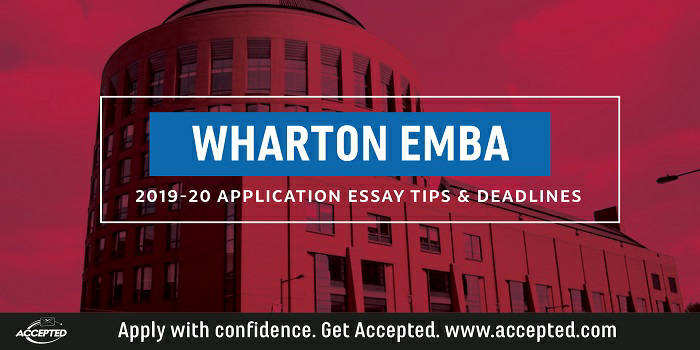
The Wharton EMBA adcom, through its three required questions, expresses its values and its interest in a relationship with students who share those values. Each of the questions highlights a different facet of this relationship. Respecting, recognizing, and responding to that vision through your essays will be the key to a successful application.
- Essay question 1 focuses on your goals and Wharton’s important role in helping you achieve them.
- Essay question 2 invites you to share your understanding of Wharton broadly and delineate your fit with Wharton’s culture and community.
- Essay question 3 seeks confirmation that you understand in practical terms what a commitment to attending the program involves.
My tips for answering Wharton’s EMBA essay questions are in italics below.
Wharton Executive MBA application essays
Wharton Executive MBA essay #1
What are your career objectives and how will the Wharton MBA Program for Executives contribute to your attainment of this objective? (750 word limit)
An effective (and natural) way to start is to briefly sketch your current career situation to set the context. You can then progress to detailing your future goals – in doing so, clarify how each step leads to the next or builds on the previous one, creating an organic flow. In describing your goals at any given point, indicate whyyou are taking that step or pursuing that role; this “why” is what truly animates your goals, elevating them from explanation to a story. Put more detail into the roles you plan immediately post-MBA and the several years following; longer-term goals need less detail, but they still should show a clear direction.
In discussing how the program will benefit you, describe what skills and knowledge you need at specific future roles/positions and how the program meets those needs. Also refer to the structure and special features of the program, detailing how they will support you and your goals.
Structurally, there are three approaches to this part: (a) weave in the “Why Wharton?” details after each goals phase, (b) have a separate “Why Wharton?” paragraph containing this entire discussion holistically, or (c) a mix of (a) and (b), adding some specific “Why Wharton?” points into the goals section and then an additional paragraph with more encompassing “Why Wharton?” points. All three work; use the one you find most natural.
Wharton Executive MBA essay #2
In his groundbreaking Ted Talk “Are You a Giver or a Taker?” Adam Grant describes three primary personality types in the workplace: givers, takers, and matchers. Based on your understanding of yourself and our program, how do you intend to give and take as a student at Wharton? (750 word limit)
First, listen to the Ted Talk, and consider how to ground your essay in its concepts of givers, takers, and matchers. As you write, if you are comfortable doing so, occasionally refer to the talk and integrate it into your discussion – doing so conveys engagement with the ideas that are clearly important to the Wharton EMBA adcom.
This question focuses on Wharton as a community and culture, on you as a person, and on the dynamic relationship that can form between you and Wharton (the pivotal phrase is “your understanding of yourself and our program”). Professional factors should certainly be the key components of your answer, but there may be community, social, and personal facets of your life where you and Wharton intersect, and you can draw on those as well.
Caution: don’t spend the whole essay explaining how you will give and take in the future as a Wharton student – rather, to be as credible, interesting, and substantive as possible, root this essay in your experience. SHOW the adcom how you will give and take (and match) by providing examples and anecdotes of this experience, and then link that experience to your planned/desired future involvement as giver/taker/matcher at Wharton.
A further benefit of using example and anecdote to make your points is that it gives you an opportunity to strategically showcase aspects of your life and experience that distinguish you and/or enhance your application.
Wharton Executive MBA essay #3
Given your already demanding job and the desire to remain committed to important family and personal obligations, how do you plan to handle this additional demand on your time once you enroll? (500 word limit)
This straightforward question deserves a straightforward answer. Discuss the accommodations you will make at work, such as delegating more, adjusting travel schedules, etc. Don’t mention every single thing you can think of – focus on the most significant two or three adjustments.
Also address your personal responsibilities and how you will meet them with this additional significant demand on your time and energy; even acknowledging that you’ll have less time at the playground with your toddler or mentioning the support of your significant other will show that you’re facing this issue squarely. If you’ve already successfully balanced school and working full time, definitely mention it.
Wharton Executive MBA essay #4 (Optional)
Please explain any extenuating circumstances of which the Admissions Committee should be aware (e.g., unexplained gaps in your work experience, choice of recommenders, inconsistent academic performance). You may also take this opportunity to share other defining aspects of your life that the Admissions Committee would not otherwise have learned from your application or resume. (500 word limit)
You can use the optional essay not just to explain a problem (low GMAT, employment gap) but also to present new material that will further illuminate your candidacy. However, if you do the latter, use good judgment and make sure your points are germane to and truly enhance your application. For structuring the essay, first, succinctly explain any points that need explaining. Then, if there is some additional content, write about it succinctly.
For expert guidance with your Wharton EMBA application, check out Accepted’s MBA Application Packages, which include comprehensive guidance from an experienced admissions consultant. We’ve helped hundreds of applicants get accepted to top EMBA programs and look forward to helping you too!
Wharton EMBA application deadlines for 2019-20:
Round 1: Application Deadline December 4, 2019
(11:59 p.m. PST); Decision Release Date January 22, 2020
Round 2: Application Deadline February 5, 2020 (11:59 p.m. PST); Decision Release Date March 25, 2020
***Disclaimer: Information is subject to change. Please check with individual programs to verify the essay questions, instructions and deadlines.***
Cindy Tokumitsu has advised hundreds of successful applicants, helping them gain acceptance to top MBA and EMBA programs in her 20 years with Accepted. She would love to help you too. Want Cindy to help you get Accepted? Click here to get in touch!
Related Resources:
• Ace the EMBA: Expert Advice for the Rising Executive, a free guide
• School-Specific EMBA Application Essay Tips
• Wharton’s Executive MBA, Where East and West Meet and Mix, a podcast episode
This article originally appeared on blog.accepted.com.
Applying to a top b-school? The talented folks at Accepted have helped hundreds of applicants get accepted to their dream programs. Whether you are figuring out where to apply, writing your application essays, or prepping for your interviews, we are just a call (or click) away.
Contact us, and get matched up with the consultant who will help you get accepted!

